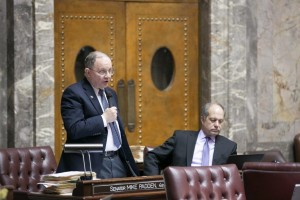OLYMPIA – The Washington state Senate paid tribute Tuesday to the late Supreme Court Justice Antonin Scalia, passing a resolution describing him as “one of the most transformational Supreme Court justices our country has ever witnessed.”
The resolution, sponsored by state Sen. Mike Padden, R-Spokane Valley, recalled Scalia as a staunch advocate of free speech and a leading advocate of a strict reading of the U.S. Constitution. In remarks on the Senate floor, Padden called Scalia “a leading thinker about the rule of law” who earned the respect of allies and opponents.
“Those of us who have practiced law recognize that most legal briefs and court decisions are workmanlike products,” Padden said. “Rarely do they approach the level of literature. In his use of language and his clarity of thought, Scalia was one of the giants of the court. Scalia will be quoted for years to come – from his rulings, his appearances in court, and his speeches.”
Senate Joint Resolution 8725 passed by acclamation on the Senate floor, following speeches by Republicans and Democrats alike. In his remarks, Padden recalled numerous comments offered by Scalia during his 30-year career on the Supreme Court bench.
— Scalia did not believe the federal constitution is a tool for change. He said:
“A constitution is not meant to facilitate change. It is meant to impede change.”
— Scalia believed the constitution’s guarantees are immune from shifts in current opinion. He said:
“[The constitution] is not a living document. It is dead, dead, dead.”
— Scalia was a principled defender of free speech – even when it involved the burning of his beloved American flag. He said:
“I think Thomas Jefferson would have said the more speech the better. That’s what the First Amendment is all about.”
— At times Scalia’s dissenting opinions could be acid. His opinion in King v. Burwell, the case that upheld the Affordable Care Act, or Obamacare, accused the majority of “interpretive jiggery pokery.” He said:
“We should start calling this law SCOTUScare.”
— Scalia was a voice for common sense in the face of our war on terror. He said:
“Is it really so easy to determine that smacking someone in the face to determine where he has hidden the bomb that is about to blow up Los Angeles is prohibited in the Constitution?…It would be absurd to say you couldn’t do that. And once you acknowledge that, we’re into a different game.”
— Scalia was a defender of the right to religious liberty and religious belief. He said:
“God assumed from the beginning that the wise of the world would view Christians as fools … and he has not been disappointed.”
— When Scalia’s views were challenged, he was forthright. After the landmark decision in Bush v. Gore came under fire, he said:
“I and my court owe no apology whatever… We did the right thing. So there!”
— Finally, Scalia was a believer in intellectual combat and the idea that the strongest idea deserves to win. He said:
“I attack ideas. I don’t attack people. Some very good people have some very bad ideas. And if you can’t separate the two, you gotta get another day job.”











